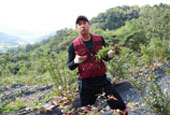
BANGKOK (ILO News) – Suk Moo Lee is a sensation in his native Korea: He has combined farming and camping to invent ‘farmping’ on his blueberry farm. In 2013, his innovation brought in US$200,000 in profit.
Suk Moo swapped his polished shoes for work boots in 2010, moving from Korea’s capital, Seoul, to rural Eumseong-gun to start his own business.
“As a little boy, I dreamed of becoming an entrepreneur. After examining the opportunities in various industries, I discovered that the agricultural sector had enormous potential for prosperity.”
His move proved wise, particularly at the height of the global employment crisis, which hit young people hard. In developed countries with few jobs available, many young people are qualified for trades that are unavailable or do not exist; and in developing countries, the absence of social protection forces many to venture into poor quality jobs where minimum labour standards are not met.
Governments are turning to further education and skills training to help reverse the youth employment crisis. Could agriculture also be part of the answer?
From a demographic point of view, it makes sense. The world population is expected to increase by a third and reach 9.3 billion in 2050, meaning more people will need more food.
As more and better farms are created, related industries in agri-business, agro-tourism, land management, mechanical and agricultural engineering will expand as well. Agricultural exports will help create jobs across the entire value chain, benefiting corporations, family farms, cooperatives and small and medium enterprises venturing into additional markets.
Suk Moo believes that global trends of urbanization create agricultural opportunities in rural areas.
“We need to expand from cultivation and harvest to diversification of agriculture-based businesses. It is imperative to connect people in the rural and city areas,” he says, referring to his new product, “farmping”.
But, is it attractive?
Agriculture accounts for 32 per cent of total employment globally and 39 per cent in developing Asia and the Pacific, according to the ILO’s Global Employment Trends Report 2014.
Yet, it seldom tops young people’s “most wanted” wish list of careers. It is perceived as representing the past and the antithesis of progress.
“Since I am a relatively young entrepreneur and lacked relevant working experience in blueberry farming, it was difficult for me to build a solid infrastructure and establish a network for my business …I was not born in an agricultural town and I had to learn and adopt farming techniques and technology from scratch.”
While there is a growing trend in industrialized economies, including those of Korea or Australia, towards offering agriculturally-focused education and incentives for young people to invest in rural areas, moving back to the countryside in developing nations remains associated with poverty, informality and archaism. Suk Moo admits it was not easy for him at first.
Studying agriculture
Improving tertiary agricultural education might be one way to improve the appeal of a sector some believe could boom in the coming decades.
There is plenty of room for improvement. In Mongolia, for example, where 32 per cent of employment is based in agriculture – according to ILO figures – only 2.35 per cent of students graduate with an agricultural degree. In Malaysia, this ratio is only 0.75 per cent. Vietnam may fare the best in the region but with only 7.99 per cent.
Suk Moo believes in investing in agriculture could lead to huge returns for young people and for developing countries.
“The agricultural sector has enormous potential for growth. tt would be a great idea for tehe Government to adopt a systematic approach to encourage and support new agri-entrepreneurs and farmers to succeed in running their own farm and agribusinesses.”











Leave a Reply